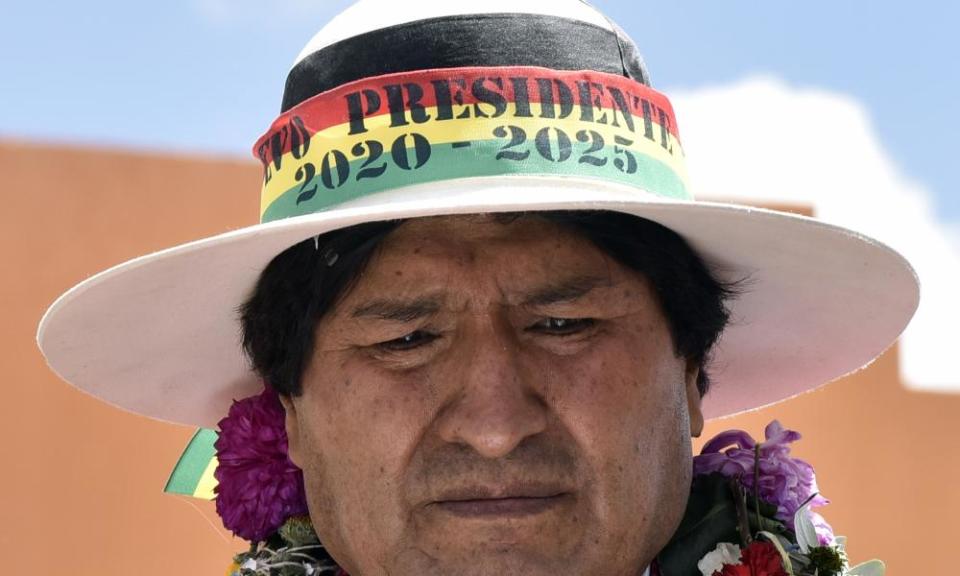Evo for ever? Bolivia scraps term limits as critics blast 'coup' to keep Morales in power
Country’s highest court has overruled the constitution, meaning Morales can now run for a fourth term in 2019 – and for every election thereafter

Orinoca, a tiny, poor village in south-west Bolivia, is an unlikely home for the monolithic Museum of the Democratic and Cultural Revolution. But this is is the birthplace of Evo Morales, the country’s president since 2006, and he remains the star of the show.
The museum houses personal belongings – including a pair of shoes he wore as a child and a roomfull of football shirts – and about 5,000 keepsakes from around the indigenous-majority country.
But the focus on Morales also hints at what critics call mounting authoritarianism by the president and his Movement Toward Socialism (Mas).
This week, the country’s highest court overruled the constitution, scrapping term limits altogether for every office. Morales can now run for a fourth term in 2019 – and for every election thereafter.
Morales, 58 – an Aymara former coca grower – was elected in 2006. The country’s first indigenous president, his 2009 constitution refounded Bolivia as a “plurinational state”.
A partial nationalisation of Bolivia’s oil and gas helped create a middle class from scratch. Bolivia is Latin America’s fastest-growing economy; 53% of its legislators are women and a fifth are under 30.
“From being a republic of classes, castes, skin colours, Bolivia today has become a country that by law has to be inclusive,” said Valeria Silva Guzmán, 27, a Mas congresswoman. Through slashing school truancy, infant and maternal mortality, and old-age poverty, she argued, Morales has “definitively changed the everyday reality of Bolivians”.
Yet Bolivia, along with Nicaragua, is now the only presidential democracy in the Americas to place no limits on re-election. Last month, a senior minister shared an image of a placard which invited Morales to stay in power until 2050.
“This is a coup against the constitution and a mockery of the referendum results,” conservative senator Óscar Ortiz told the Guardian – referring to a plebiscite 18 months ago in which Bolivians narrowly rejected presidential re-election. Ortiz called for citizens to spoil their votes in this Sunday’s judicial elections and vowed to challenge the case abroad.
The US state department expressed “deep concern” over the ruling, and some Bolivian opposition leaders, warning of an imminent “Venezuelan-Cuban-style” dictatorship, have called for street demonstrations, although few expect serious unrest.
Yet despite the referendum results – which the government claims were invalid due to an opposition smear campaign directed by Washington – it is unclear that a majority prefer the alternative. Recent demonstrations against re-election were reportedly dwarfed by subsequent pro-Morales rallies.
The main opposition leaders, “all with roots in upper-class, mostly white, elite families, have been unable to generate a discourse that would appeal to a broad base of Bolivians,” said Diego von Vacano, a Bolivian political scientist at Yale University. Morales has, meanwhile, used his active social media presence to label his opponents agents of “the empire”.
The sharpest criticisms of Morales have come from erstwhile allies, however. Felipe Quispe, an indigenous leader who once branded Mas policies “capitalism with an Indian face”, is in hiding after police quashed recent anti-corruption protests. Mas is a “soulless, disgusting corpse” that “stinks” of corruption, he said in a recording this month.
“The outlook is bleak,” said Roger Chambi, 27, a student and radical Aymara activist. “It’s an outrage against the decision of the people. You see where politics and justice has got to in Bolivia. The worst thing is that we saw this coming, but could only watch.”
Guzmán blames the movement against re-election on “hegemonic media” and a “post-truth” environment. “It is caudillos [strong men] that have changed the history of this part of the world,” she argues. “Men like Evo Morales, that fight for the majority, aren’t born every two or three years.”
While Bolivian democracy will survive, said Von Vacano, “it now faces a new legitimation crisis”.
Some sense a wasted opportunity for Bolivia’s longest-serving president, who has often promised to retire to a farmer’s life. “Morales could have attained the moral stature of a Mandela or a Simón Bolívar,” said Von Vacano, “had he chosen that route.”

